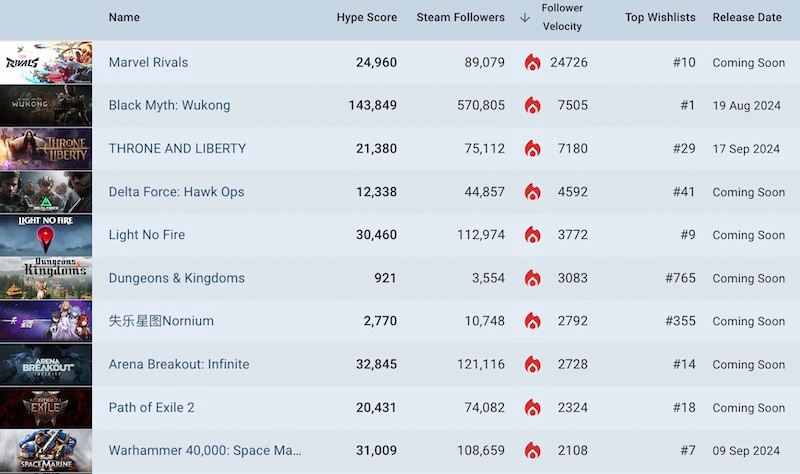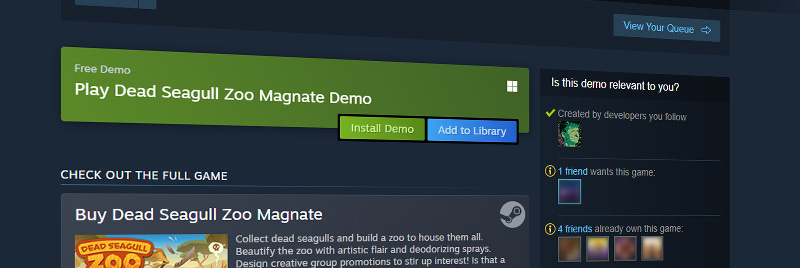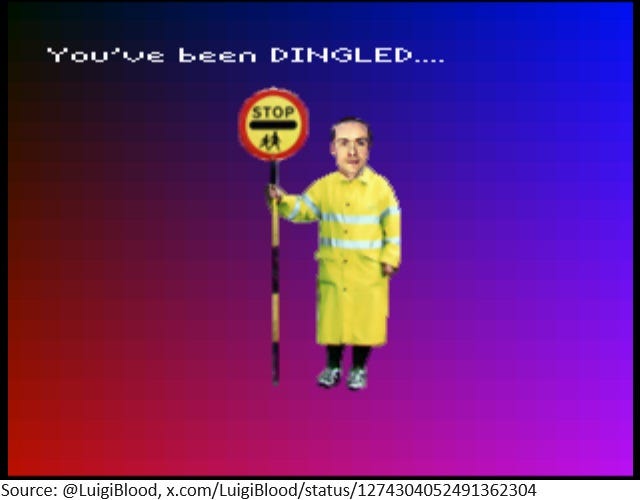Summer special: what generative AI could do... for Pac-Man?
Publikováno: 30.7.2024
And in more factual news: Steam demo updates & lots of discovery news.
[The GameDiscoverCo game discovery newsletter is written by ‘how people find your game’ expert & company founder Simon Carless, and is a regular look at how people discover and buy video games in the 2020s.]
Those of you with good memories will recall it’s at this point in the summer we get a bit… sillier with a newsletter (using guest content, cos look, we’re on holiday!). And to date, the GDCo newsletter has almost entirely dodged the ‘AI and games’ trend.
Well, no more! But look, we don’t feel qualified to talk about it ourselves. Luckily, we’ve found a guest interviewee we’ve been assured absolutely, definitely knows what they are talking about. Phew - that’s a weight off of our shoulders, for sure…
Imagine: what generative AI could do for Pac-Man?

So today, GDCo is quizzing well-known AI-in-game-development consultant “AI Baby, the AI Guru” (yes, that’s his real name?) who reportedly has the ear of management at all the top game developers - except Nintendo.
ABAG, as he is sometimes known, also leads exclusive forest retreats, where psychoactive substances may or may not be present that aim to “reconnect us with the greatest AI of all.”
So he’s the perfect person to talk to about the future of video game AI, especially since your boss has been bugging you to ‘use AI to improve shareholder value’ for a few months now, if you’re a public company (or looking for VC!) Take it away, ABAG:
Q: We’ve seen EA’s Andrew Wilson say that he’s asking how his company could become 30% more efficient through using AI. When advising CEOs, as you do, what do you suggest their first step be?
It’s me, AI Baby, the AI Guru! Everyone calls me that, but you know what? I say AI is a boring word, a limiting word. That’s right. I like the term “magic” instead. If I ask you, what can you do with AI, the answer is “who knows”?
But if I ask you, what can you do with magic? Then you start to understand what I’m talking about here! So if you think about it, the real question is what the Electronic Arts corporation do with magic? And Andrew Wilson thinks “become 30% more efficient” is the answer? That’s because he has no imagination, none at all. We’re talking magic here, folks.
Q: What do you say to developers at big game companies who are handed down AI edicts from on high, as if they’re the Ten Commandments? How do they practically integrate AI into their business?
First of all, I tell them the reason AI is handed down from on high by their upper management is because it’s like a divine gift. Did human beings invent AI? Don’t bet on it, is all I’m saying. You look at AI and you’re like, how could anyone make that? It’s magic! And if you want to integrate magic into your business, there’s no way to do it other than to let it flow, man, just like that. Let it flow like water into your process. Water is good, right? It nourishes.
Q: To the naysayers at those companies, how would you get them to ‘turn their frown upside-down’? Explain the attitude you need to be successful at integrating AI deeply into your AAA games…
I do these retreats, see, where my students reconnect their essences to the pathways of our ancestors, right? And when they come out of those experiences, they aren’t worried about the little things anymore, like, how is the AI going to actually work, or how does AI even do anything to make the game better, or how is AI usage going to scale.
Who cares about any of that? The point is, we are all AIs, all of us, and we’re all going to return to the great training corpus one day.
Q: How about indies - what do you advise them about putting AI references in their game pitches? How front and center should they be?
Usually indies can’t afford the full consulting experience that I offer. But I do a lot of pro bono work for them because of course I love indies like everyone else, and I want to see them succeed.
So to help out on their pitches, I say, look, nobody’s interested in your unique perspective or experience as a human being in the world. Who cares? What the people truly want is to see the world from the perspective of a big slurry of everything a tech company could get its hands on over the last couple years.
Q: For those that say that AI has been in video games for decades - heck, there’s been an AI Summit at Game Developers Conference for many years now - how is it different this time?
I’m going to admit right off the bat here that I’m not really a tech person, I have to leave those little blips and bleeps to the cyber-heads, you know? But what I do know is that when I say AI and when my investment buddies say AI, we mean the cool new thing that’s going to change the world, not, like, the thing that makes the Pac-Man ghosts chase you.
Q: What’s the #1 mistake people make when they presume that generative AI is potentially overhyped when it comes to the video game space? I’m sure you know how to correct them…
Everything you need to know about naysayers is right there in the name. They are the people who say, “nay.” That’s what the name means, right? Naysayers. So when the naysayers say “nay,” I know that they’re saying that because that’s what their name is telling them to do. That’s called nominative determinism… I don’t remember your original question, but the point is, you wouldn’t say “nay” to an AI, because you can’t. You just can’t.
Q: Can you give an example of a classic video game that would have been made exponentially better by using generative AI? Explain how much better it would have been!
I mentioned Pac-Man earlier, and one of the things Pac-Man doesn’t have is deep, compelling stories that engage the audience at multiple levels. AI-driven interactions offer the ability for players to interact with Pac-Man in a natural, human way. No more canned dialogue, no more need to hire writers.
For example I could say, hey Pac-Man, what are some recipes I can make with a can of beans? And Pac-Man would have a detailed answer. Can you even imagine how much better the game would be if you added that kind of functionality?
Q: Please provide a rebuttal for your critics - however misguided - who might say that you’re mainly in this for the consulting dollars.
Listen, I don’t do this for the money. I do this because I believe. Everything I’ve done, from when I said cryptocurrency would replace government currencies, to when I said the metaverse would replace the internet, to when I said blockchain and NFTs would replace the real economy, to when I said virtual and augmented reality would replace actual reality… I really meant it. I really believe.
[Thanks to The Writer Will Do Something and Eliza co-creator Matthew Seiji Burns for arranging this little chat, which, in case you were wondering, is 100% fictional. It’s his 3rd GDCollab, after Pickle Fighters’ indie breakout dev Chad Blastovic in summer 2022, and mysterious AI entity ‘Greg Paul Thomas’ in 2023. Thanks for indulging our summer silliness.]
Steam’s demo fixes patch the ‘Prologue’ loophole
So, uh, back to the ‘real world’ - it’s all facts* from here on out, folks - with the news that Steam has made a bunch of changes to demos to make them “an even more powerful and flexible marketing tool.”
Valve’s improvements here look to end the ‘why do a Prologue?’ loophole once and for all. Some context: we’ve reported on free Steam Prologues before, essentially a separate Steam app instead of - or as well as - a demo version of your game. Here’s a recent example - Crime Scene Cleaner: Prologue.
Steam’s on the record as saying ‘we really don’t like Prologues, but we won’t actively remove them’ - partly because a small minority of them were genuinely a different experience to the main game. (And partly because policing them was difficult?)
Anyhow, some devs still created Prologues because the separate app had additional discoverability ‘juice’, giving you extra chances to trend on the platform. (Even though wishlists on Prologues didn’t carry through to the full release.) Here’s Valve’s solution:
There’s an optional separate page for your game’s demo:“By default, your free demo appears as a button on your base game's store page. But if you want to have a separate store page for your demo, you can now enable that in the 'edit store' section.” (In this scenario, your demo can also have reviews.)
The demo page has automatic cross-promotion with your game:“Stand-alone demo store pages will automatically display both the demo install button as well as a widget linking back to the full game for players interested in wishlisting or purchasing the full game.”
All demos get the discoverability boosts that Prologues used to get:“Demos now behave more like free games and can appear… in charts such as the "New & Trending", on the "New on Steam" page, and on relevant tag and category pages.”
On demo launch, you can notify your existing game wishlisters:“We've now also made it so that when releasing your playable demo, Steam can send email to wishlisters of your base game and followers of your developer/publisher.” The notification can also be delayed to time with the start of Next Fest, etc.
By and large, this is a smart and very well thought-out change. One commenter does raise an issue some are wondering about: “There was some developer discontent about prologues taking up New & Trending space, making it harder for indies to reach a wider audience. This can potentially make the issue even worse.” We’ll have to monitor this! [UPDATE: looks like this is already a thing.]
[*All facts, with one exception: the example game used in the screenshot (above) is Dead Seagull Zoo Magnate, a made-up, Valve-invented game used as one of the quests for the Steam 2022 Summer Sale. ‘Beautify the zoo with… deodorizing sprays’, huh?]
The game platform & discovery news round-up…

Finishing up for today, we’ve got what can only be described as ‘a whole heap of discovery and platform news’ - so let’s get straight to it:
As analyzed in last Friday’s Plus newsletter, we’ve got a new feature for GDCo Plus members - Steam ‘follower velocity (last 7 days)’ for unreleased games. And here (above) are the current ‘trending’ titles sorted by recent follower increase - with Marvel Rivals adding a load of interest, thanks to a big closed beta.
With its Fortnite money still flowing on other platforms, Epic continues to be activist with mobile app stores, bringing Fortnite “to other mobile stores that give all developers a great deal.” That would include its own store (duh!), AltStore on iOS in the EU, but not the Samsung Galaxy Store on Android “in protest of Samsung's anticompetitive decision to block side-loading by default on Samsung Android devices.”
A good GameDeveloper.com piece, ‘Why is it so expensive to make games in the United States?’, talks about an underdiscussed issue. Cost of living and healthcare issues - combined with a skilled global workforce for games & a ‘tech biz’ brain drain - are making it tough to create profitable game companies in the U.S.
Console microlinks: the first Call Of Duty title to appear on Xbox Game Pass is 2023’s CoD: Modern Warfare 3; Sony’s PlayStation VR2 is $200 off ($349) as part of Sony’s summer sale, as the Steam PC app for PSVR2 pops up; the latest PS5 OS update has Remote Play privilege changes & adaptive charging for controllers.
A new Wall Street Journal article on Twitch has $ data on the (apparently still unprofitable!) Amazon-owned service: “In 2023… [it] generated about $667 million in ad revenue and $1.3 billion in commerce revenue.” Not shabby - it’s just difficult to easily monetize and grow post-COVID ‘bump’, hence concerns over more layoffs.
A little Steam tidbit: if your games make enough $ on the platform (we’re unsure of the threshold), Steam will waive your $100 fee to add new ones. Don’t forget that the fee is recoupable after you make $1,000 anyhow. So it’s just a minor courtesy for trusted devs on Valve’s end.
Meta’s Quest & Horizon AR/VR aspirations & spending get harshly press-checked again: Yahoo Finance has a piece on the $45 billion spend so far citing internal “chaos” through multiple re-orgs, and The Information claims that ($) Reality Labs’ hardware teams are being asked to cut spend by 20% between 2024 and 2026.
Three interesting op-eds: is CCU the best metric for measuring game success on PC/console?; players aren’t finishing games, and some people think “that’s a problem”; what happens to make well-crafted PC games have “[unit] sales that are OK, but not great”.
Netflix Games has a new president, Alain Tascan - formerly of Epic and Ubisoft Montreal - making it clearer that Mike Verdu’s ‘moving to another role’ was an explicit sidelining. We’d expect to see a continued strategy shift here - further towards utilizing existing Netflix IP, than away from it?
Matt Hackett says: “stop describing your game using other games”, suggesting “It requires your audience to be familiar with those games” and “It creates pre-conceived notions, setting high expectations.” Yep - but it’s great to make a game that streamers can compare to hit games in their YouTube video titles. (Just make them do it!)
Esoteric creative culture microlinks: what makes Star Wars fandom so unique? (It’s “hooking kids early and crafting universal stories that encourage lifelong loyalty”); the work (and extreme stress!) behind running music festivals; how does marketing work (and does it work?) in the traditional physical book-selling world?
Finally, in a fun bit of video game archaeology, the ‘obscure Mario content’ Twitter account Supper Mario Broth has highlighted: “[This] crash screen from the prototype version of [1999’s] Mario Artist: Paint Studio for the Japan-only Nintendo 64DD add-on.”
What gives? Well: “The presence of a British school crossing patrol officer is due to the game being mainly developed by Software Creations, a British studio.” Always follow the Green Cross Code, even when operating video game devices, folks:
[We’re GameDiscoverCo, an agency based around one simple issue: how do players find, buy and enjoy your PC or console game? We run the newsletter you’re reading, and provide consulting services for publishers, funds, and other smart game industry folks.]

